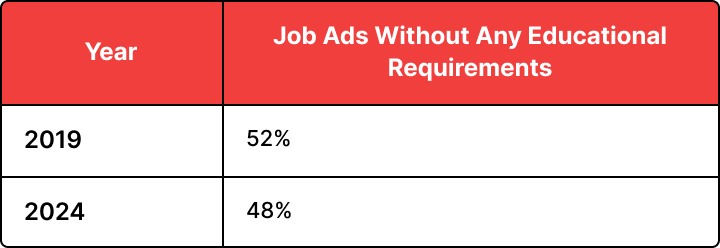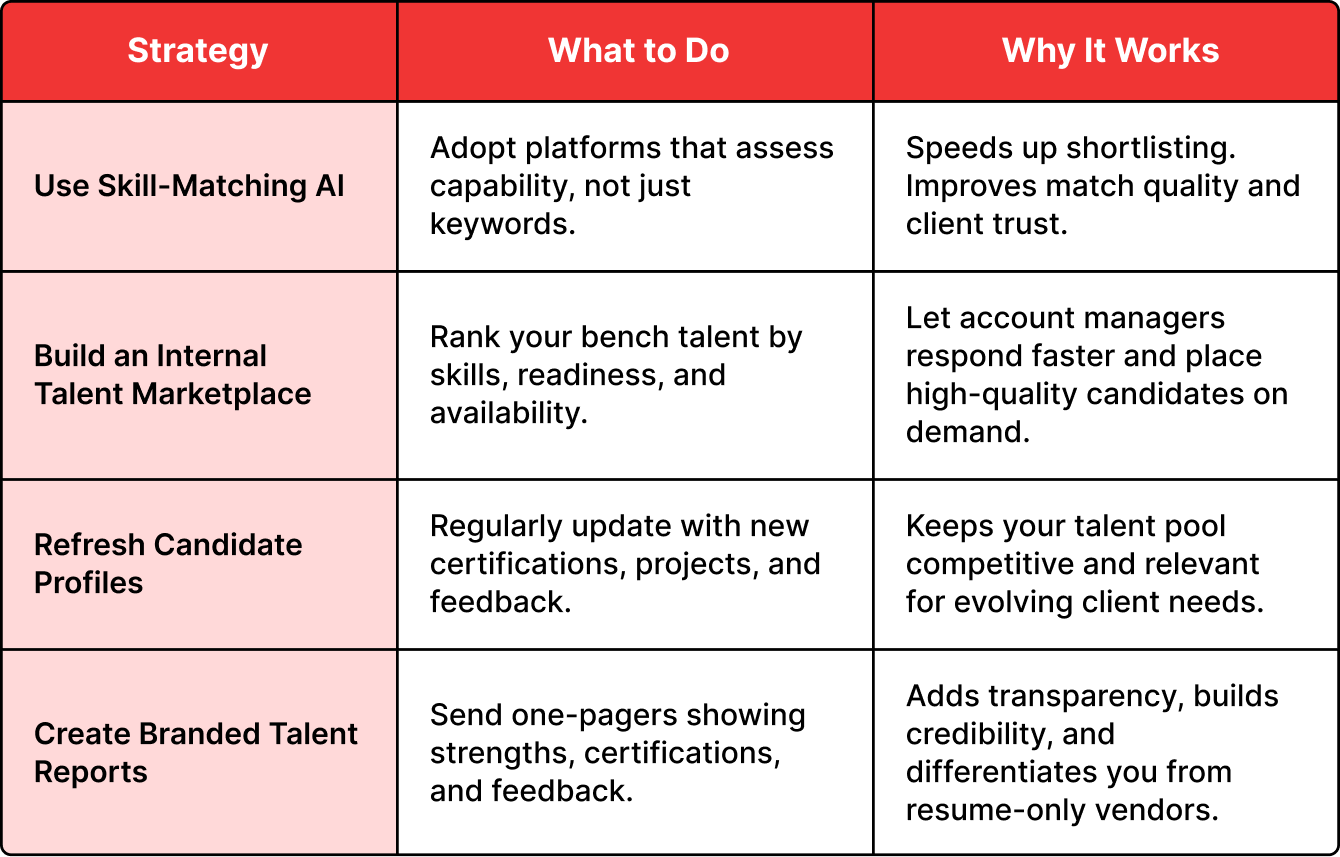You already know that in today’s market, the best talent doesn’t always come with the best-looking resume. So why are degrees still your first filter?
Skills-based hiring prioritizes what candidates can do, not just what they’ve studied. By focusing on capabilities, not credentials, you tap into a wider and more agile talent pool.
McKinsey finds that skill-based hiring can lead to five times better performance than education-based hiring and twice as effective as hiring based on past work experience. That means more potential matches for the roles.
This shift is more than a trend; it’s a more innovative, faster way to meet client demands. It prioritizes performance over pedigree and gives overlooked talent a real shot at shining.
Let’s explore how skills-based hiring is changing the game.
Growing Trend and Adoption of Skills-Based Hiring

The rules of hiring are changing fast.
Here’s how skills-based hiring is becoming the path forward:
1. Labor Market Pressure Is Driving Change
With high demand and scarce talent, employers are ditching rigid requirements to widen their options.
They’re choosing agility over tradition, and it’s paying off in better matches and faster hires.
2. Employers Are Dropping Degree Requirements
The shift is happening across industries:
- IBM, Google, and Bank of America no longer require degrees for many roles.
- 81% of employers say they now prioritize skills over education when screening talent.
This isn't a trend; it’s the reality of new hiring.
3. Job Ads Are Reflecting the Shift
More job descriptions are ditching degree filters:

That’s a steady rise, giving staffing teams like yours more flexibility to pitch truly qualified talent.
4. Skills-Based Hiring Is Scaling Globally
Hiring for skills expands your reach and boosts placement success:
According to Silvia Lara, Senior Data Scientist Economic Graph at LinkedIn, hiring based on skills increases the eligible candidate pool by 6.1x globally.
This means more reach, placements, and ultimately more client wins for you.
Impact on Workforce and Diversity

Barriers like education bias, work experience focus, and geographic limits exclude diverse, skilled talent.
Skills-based hiring tears down these barriers and opens access to talent that’s been overlooked for too long.
1. Expanding Access for Underrepresented Talent
When you drop unnecessary degree filters, you open doors to people with real-world skills and grit.
This means more opportunity for:
- Self-taught developers
- Veterans transitioning to tech
- Career switchers with project experience
- Candidates from underserved communities
These professionals often bring sharper adaptability and stronger loyalty than traditional hires.
2. Boosting Diversity and Inclusion Metrics
Diverse teams outperform homogeneous ones in creativity, decision-making, and innovation.
Skills-first hiring helps meet DEI goals without sacrificing speed or quality. You're not lowering the bar, you’re widening it to find hidden excellence.
3. Reducing Bias in the Screening Process
Skills-based evaluation reduces bias tied to college prestige or past employer branding.
It’s a step toward fairer hiring, which should be based on what people can do, not where they come from.
Common Biases and How Skills-Based Hiring Helps Fix Them:

This shift builds stronger teams and aligns with client expectations for equitable hiring practices.
Also, don’t overlook the human element: soft skills like communication, adaptability, and collaboration are key differentiators. Learn more in “The Importance of Soft Skills in the Hiring Process.”
Therefore, diversity isn’t a checkbox. It’s a business advantage and a hiring approach that prioritizes skill.
Challenges in Implementing Skills-Based Hiring
Shifting to a skills-first model is powerful, but it's not plug-and-play.
Here’s where most hiring managers hit roadblocks, and what you can do about them:

Pro tip: Start small. Pick one or two roles, build a skill-first hiring flow, and track performance.
Consultadd is here to help with all these challenges. By integrating hands-on skill validation, compliance checks, and candidate readiness reports, we remove friction from skills-first hiring and replace it with speed and confidence.
Corporate Strategies and Innovations
Skills-based hiring isn’t just a trend; it’s a strategic shift led by the biggest business players.
Top companies embracing it aren’t just improving hiring but rewriting the rules of workforce success.
Approaches to Upskilling and Talent Management
Filling roles fast is no longer enough. Clients want talent that grows with them.
That’s why smart staffing agencies shift from reactive placement to proactive talent development.
Here’s how you can ensure that yours is, too:
1. Build Talent Pools with Growth in Mind
- Don't wait for client demand. Create segmented pools of candidates trained in future-ready skills.
- Prioritize tech, automation, green energy, healthcare, and customer experience roles.
2. Track Skill Progress
- Use internal dashboards to monitor candidate skills, not just their job history.
- Build short “skill snapshots” for each candidate to showcase their value to clients.
By embedding upskilling into your pipeline, you become a true strategic partner, not just a supplier.
For a deeper dive into how you can align candidate development with long-term business growth, check out “From Skills Gap to Strategic Growth: Talent Mapping That Delivers.”
Innovative Hiring Platforms and Internal Successes
Technology should remove friction, not add to it.
Agencies adopting the right tools are outpacing the rest in speed and quality.
Here’s what you can apply right now:

As hiring managers, driving real value isn’t just sourcing, it’s developing, matching, and future-proofing talent.
This is where Consultadd steps in. We go beyond sourcing; we actively vet, validate, and support talent with skill proof, live assessments, and performance documentation, helping you win client trust faster.
Next, let’s look at how skills-based hiring strengthens job fit and prepares the workforce for tomorrow.
Benefits of a Skills-Based Approach

When clients demand results yesterday, traditional hiring filters just slow you down.
Focusing on degrees or job titles leaves out incredible candidates ready to deliver today. A skills-based hiring approach isn't just a trend, it’s a competitive edge.
Here’s why more staffing leaders are rewriting the rules:
1. Bigger Talent Pools, Better Matches
- As Silvia Lara, Senior Data Scientist Economic Graph at LinkedIn says, you can 6x your qualified candidate pool when you focus on skills over job titles.
- That means faster placements, more options, and less scrambling to fill niche roles.
- Especially useful for emerging tech, remote work, or cross-functional teams.
2. Faster Placements, Lower Time-to-Fill
- Skills data lets recruiters skip the guesswork and zero in on real capability.
- Some agencies have reported a significant reduction in time-to-fill using skill-first platforms.
Moreover, faster placements mean happier clients and more repeat business.
3. Real DE&I Impact
- Hiring for skills removes hidden bias around schools, backgrounds, or job gaps.
- You’re giving qualified people a fair shot—and building diverse, high-performing teams.
- It’s not just ethical. It’s effective.
4. Improved Client Confidence
- Clients are tired of vague resumes and overused buzzwords.
- A skills-first submission backed by assessments or projects builds instant trust.
- It shows you understand what “good” looks like; you prove it, not pitch it.
5. Long-Term Talent Growth
- You’re not just filling jobs. You’re building communities.
- Skill-based hiring makes it easier to track growth, promote from within, and upskill over time.
That’s a retention win for clients and bragging rights for your agency.
A global talent expert, Bryan Hancock, highlights a decisive shift in hiring mindsets.
He shares,

“Look at a college degree: if it’s not needed for a job, not having one shouldn’t be a barrier.”
This thinking is reshaping corporate strategies. Businesses are realizing that talent can come from non-traditional paths, such as boot camps, self-learning, or previous roles without flashy titles.
Moreover, Bryan Hancock captured it perfectly:
“If you have the skills, no matter where you learned them… you should be able to do the work.”
And that’s precisely what today’s best strategies are designed to prove.
Conclusion: Closing Talent Gaps with Skills-Based Hiring
Today’s hiring calls for more than quick placements, it demands skill-first strategies that actually deliver.
Skills-based hiring isn’t a trend. It’s a move toward precision, potential, and lasting client trust. It helps staffing teams spot high-performers others overlook and prove their value with every hire.
Because when credentials fall short, skills close the gap. The mission stays the same: deliver real, ready talent.
Consultadd transforms this vision into reality, equipping you with confidence and control at every step. With over 5,000 successful staffing engagements and 14+ years in business, we know what works and lasts.
Here’s how we help staffing agencies like yours win:
- Safe, reliable hires: Each candidate is vetted for skill, compliance, and experience, ready to deliver on day one.
- Lower turnover risks: No surprises. Our talent stays, performs, and contributes to long-term success.
- Seamless compliance: From visa documentation to regulatory checks, we handle it, so you don’t have to.
- Continuous support: Post-placement, we continue to check in because success doesn’t end at hire.
And we don’t stop there:
- 1:1 account managers ensure personalized, high-touch service.
- Top 100 candidates placed in the last year across leading roles.
- Trusted by ~65 staffing companies over the past year alone.
- MSAs signed with top firms like Robert Half and Teksystems.
- Ready-to-deploy talent sourced in less than 24 hours.
- Strong university ties to tap fresh, high-potential talent early.
The future of hiring belongs to those who act on skills and act fast. Partner with Consultadd to build the future of hiring smarter and sooner.

